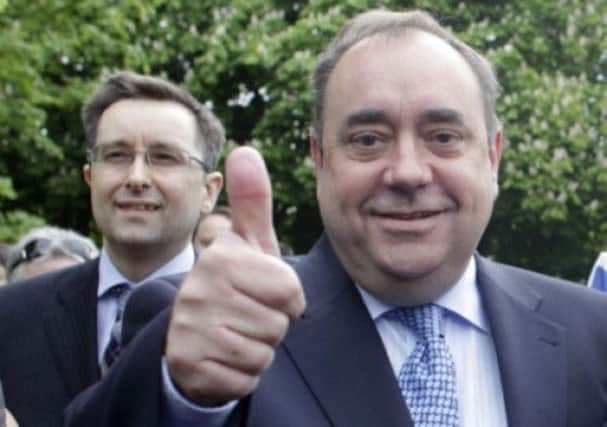Euan McColm: SNP’s distancing ploy won’t look so clever come pocket money time


If you’re a Labour supporter, it means the Conservatives are in chaos, and the next General Election is in the bag. If you’re a Tory, it shows you’re on the right track, but just have to redouble your efforts on the issues of immigration control and welfare limits. And if you’re a Scottish Nationalist, it proves beyond doubt that England is a right-wing country, unrecognisable to the compassionate millions who live north of the Border.
In fact, the only thing that’s certain is that – during a mid-term election – Ukip did remarkably well, securing 25 per cent of the vote. Leader Nigel Farage (he’s affable and fun, “they” say, so, am I the only person in Britain who doesn’t fancy going for a pint with him?) declared the result would send shockwaves through British politics. His party and its supporters had been abused and attacked by the political establishment, he explained, and had responded in such a way that the mainstream had been left stunned.
Advertisement
Hide AdAdvertisement
Hide AdWhether, however, this truly does confirm Nigel Farage’s Ukip as the fourth party in UK politics is not yet at all certain. We won’t know whether this was a protest or the beginning of a political revolution until the next round of elections.
If Ukip can build on, or even maintain, the sort of support they attracted on Thursday then, yes, it was a shockwave. Things have changed. But what if they don’t? What if, come General Election day, voters line up again, on left-right lines, behind either Labour or the Tories? I loathe a smart Alec as much as you do, but, you know, I suspect that might happen.
Rather than looking into a cloudy crystal ball, let’s look at how those other parties reacted to the result, which saw Ukip return 147 councillors in elections to 34 local authorities, and come second to Labour in the South Shields by-election caused by David Miliband’s departure.
There was some good news for Labour. The party lost no seats to Ukip and they retain a poll lead over the Tories. That lead has dropped, though, from 14 points to just six. Leader Ed Miliband’s dream of becoming prime minister is far from becoming a reality with those sorts of numbers at this stage in the electoral cycle.
Labour claimed victory on the night, gaining 291 councillors while the Tories lost 335. But Labour achieved that result with a far-from-good-enough 29 per cent of the vote. That’s less than they got at the 2010 General Election. If we were to be terribly cruel we might point out that Scottish Labour was all but fatally wounded in the 2011 Holyrood election when it scored 31 per cent in the constituencies and just shy of 27 in the regions. The story of victory this week doesn’t ring true.
Things may not be so bright for Labour as party officials claim, but they’re a lot darker for the Tories. Prime Minister David Cameron was conciliatory after the result. He might once have derided Ukip as a party of “fruitcakes, loonies and closet racists”, but, after the votes had been counted, he was quite clear that the views of those who had been seduced by Farage had to be respected. He would redouble his efforts to win those people over.
The PM identified immigration and welfare as priorities in this quest. It’s one thing to identify priorities, however, and quite another to know how to address them. Logically, in order to woo back those who went with Ukip, the PM will have to take the Tories further to the right. This – despite his opponents’ characterisation of him as a cold, uncaring toff – goes against Cameron’s instincts, which are to remain near the political centre. And how does he bring along those centrist voters who came to him from Labour three years ago? Cameron’s challenge is huge.
The SNP saw an independence campaign opportunity in the result. The party’s director of communications, Kevin Pringle, remarked on Friday that “Scottish politics looks very different from Westminster politics this morning”. That was decent enough spin, in keeping with the Nationalists’ narrative that Scots have fundamentally different priorities to the English, but it was nonsense. Westminster politics was represented on Thursday solely by the South Shields by-election, where Labour held its seat.
Advertisement
Hide AdAdvertisement
Hide AdOthers in the party – including MP Pete Wishart and MSP Sandra White – joined in. The remainder of the UK was now far more right wing than Scotland, said Wishart, while White said the Ukip result was evidence that Scotland must now choose independence.
That doesn’t add up. For one thing, though Labour had a far from triumphant night, it was most bleak for the Tories. Surely, in a General Election, Ukip – if it wins any seats at all – is more likely to take them from Tory than from Labour MPs?
Scottish Nationalists are keen to suggest that Westminster politics is whizzing to the right when, in reality, Ukip encroaching on Tory territory may well let Labour squeeze through just enough to form a coalition with the Liberal Democrats.
But there’s another problem with that SNP line, and it brings back into focus their disarray over currency. If an independent Scotland is to keep the pound through membership of a “sterling zone”, as the SNP says it would, then future Westminster governments would have to give their approval to Scottish budgets. They’d have the final say over debt and deficit.
A Nationalist argument that Westminster is lost to the right has implications then. Why, I’m bound to ask, would centre-left Scottish Nationalists give such power over their spending plans to right-wingers with whom they refuse to share a country? If the SNP truly believed the centre left had no Westminster future it couldn’t, in all conscience, do that, could it?
Twitter: @euanmccolm